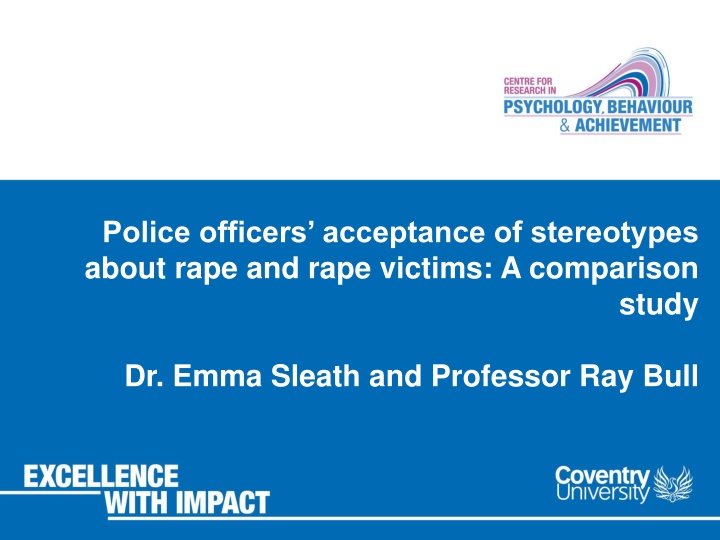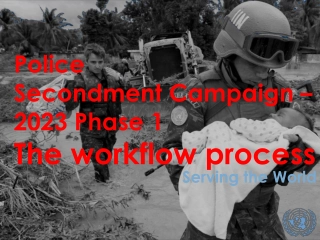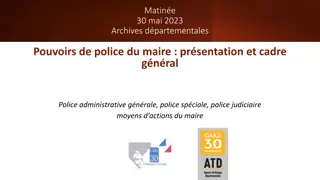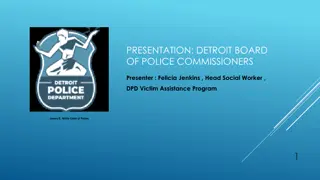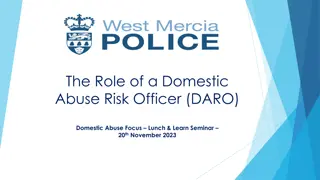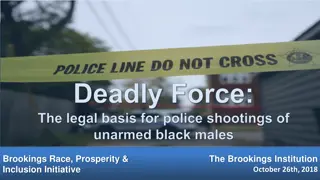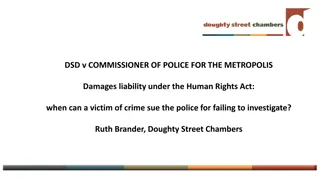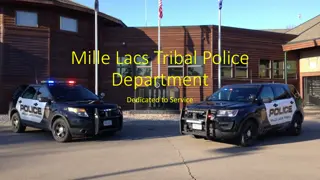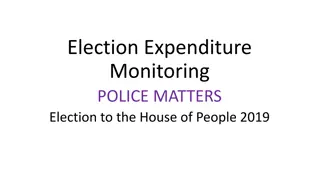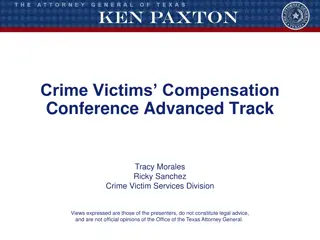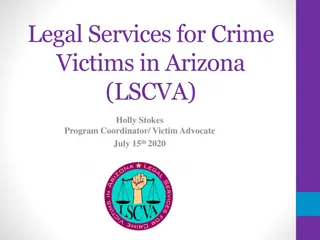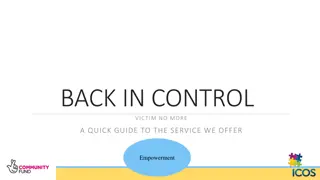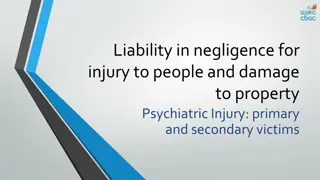Police Officers' Acceptance of Stereotypes about Rape and Rape Victims
This study compares police officers' acceptance of stereotypes related to rape and rape victims with those of psychology and law students. It delves into the prevalence of rape myths within society and the potential impact on reporting levels and conviction rates. The research sheds light on the attitudes of police officers towards rape victims and highlights the need to address negative perceptions within law enforcement.
Download Presentation

Please find below an Image/Link to download the presentation.
The content on the website is provided AS IS for your information and personal use only. It may not be sold, licensed, or shared on other websites without obtaining consent from the author.If you encounter any issues during the download, it is possible that the publisher has removed the file from their server.
You are allowed to download the files provided on this website for personal or commercial use, subject to the condition that they are used lawfully. All files are the property of their respective owners.
The content on the website is provided AS IS for your information and personal use only. It may not be sold, licensed, or shared on other websites without obtaining consent from the author.
E N D
Presentation Transcript
Police officers acceptance of stereotypes about rape and rape victims: A comparison study Dr. Emma Sleath and Professor Ray Bull
Structure of presentation 1. Systematic review findings regarding police officers perceptions of rape victims that focusses on victim blaming and rape myth acceptance 2. A comparison study of police officers rape myth acceptance with psychology and law students (in press with Violence and Victims journal)
Background Rape myths Rape myths are prejudicial, stereotyped or false beliefs about rape, rape victims, and rapists (Burt, 1980, p.217) Myths are fairly widely accepted within society 19-57% levels of acceptance of some myths (Sussenbach & Bohner, 2011) Function is to shift responsibility away from the perpetrator and direct it towards the victim (Anderson et al., 2001) Their acceptance has been argued to contribute to: Low reporting levels of rape Case attrition during the police investigation stage Poor conviction levels
Background Police officers attitudes about rape victims Historically (and somewhat currently) police officers are perceived to hold very negative attitudes about rape victims This is very problematic given Role as first responders or investigators of sexual offences. Potential influence on victims of rape However, the research findings using police officer samples is very limited
Systematic review: Selection criteria Methodology Inclusion criteria were: Police officer sample A quantitative or qualitative assessment of attitudes regarding rape victims (original data, no review articles) English language, peer-reviewed journal articles published between the years 2000-2014 Databases and hand searching. Google scholar to identify further relevant citations.
Review article summary Anglo-American concentration of studies: England and Wales (2), the U.S. (5), Australia (2), Sweden (2), South Korea (1), Norway (1), and Slovenia (1). Total number of police officers included in the samples was 3,072 male police officers and 842 female police officers. Age range was very broad from 18 - >65 years of age with means ranging from 26 40 years of age. Years of service ranged from 0 45 years. Broad range of police ranks and levels of specialist training to deal with sexual offences within the samples.
Review findings Victim blaming Occurred at a low level e.g., Wentz & Archbold (2012) found only 2% of police officers produced victim blaming statements Linked with characteristics of the victim (e.g., acquaintance level) Consistent with student/general population samples Victim credibility Linked with participant characteristics (e.g., gender of participant) Rape myth acceptance Occurs at a higher level than victim blaming e.g., she lied myths Linked with participant characteristics (e.g., gender of participant)
Review findings Police specialist training Years of service and experience in specialist role do not influence victim blaming. Limited evidence that specialist training reduces level of victim blaming Police officers with less experience in carrying out sexual offence investigations tend to be more accepting of rape myths No clear evidence that specialist training reduces rape myth acceptance
Review findings Impact on case processing (e.g., decisions to charge) No evidence that (i) levels of victim blaming or (ii) rape myth acceptance relate to case processing decisions Victim credibility does have a relationship with case processing Conclusions Limited evidence base to draw clear conclusions Findings reflect those in general population samples
Study 2: Comparison study of RMA Aim: To establish whether police officers do accept stereotypical rape myths at a higher level compared to members of other populations. Three comparison samples: (i) police officers, (ii) law students, and (iii) psychology students Illinois Rape Myth Acceptance scale (7 sub-factors) She asked for it It wasn t really rape He didn t mean to She wanted it She lied Rape is a trivial event Rape is deviant event
Sample 147 psychology undergraduates (73 males and 74 females). Age range was 18 to 37 years (M = 19.30, SD = 2.10). 82 law students (60 females and 22 males). Age range was 19 to 32 (M = 20.92, SD = 1.46). 123 police officers (60 males and 63 females). Age range was 21 to 54 years (M = 36.14, SD = 6.55).
Findings Total IRMA score - Gender X Group A significant main effect of gender, where males accepted myths at a higher level than females. No significant main effect of group (or a significant interaction)
Findings sub-factors of IRMA She lied Significant interaction between group and gender Male police officers accepted myths at a higher level than (i) male psychology students and (ii) male law students Female police officers (same effect as above) She asked for it Significant effect of group Psychology and law students accepted myths at a higher level than police officers He didn t mean to Significant effect of group Psychology students accepted myths at a higher level than police officers No difference on the other four sub-factors She wanted it; It wasn t really rape; Rape is a trivial event; Rape is deviant event
Overall conclusions No clear evidence in the systematic review or the comparison study that police officers hold more negative attitudes about rape victims than other populations Problematic in relation to the she lied myths, particularly because victim credibility was showed to relate to case processing decisions Problematic in that any negative attitudes may impact on victims of rape Future directions: Build evidence base particularly in relation to impact on case processing Link to specialist training
Any questions? Dr. Emma Sleath emma.sleath@coventry.ac.uk Centre for Research in Psychology, Behaviour, and Achievement
